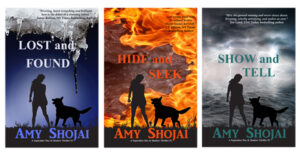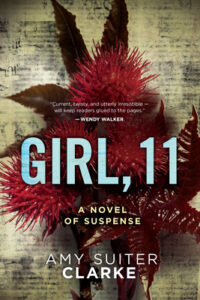Scroll down to read Part I
It must be a thrill to have your daughter follow in your footsteps, but as an author yourself, you know how hard this business can be. What role have you played in Nicole’s writing, both artistically and career-wise?
TERRY: My Role in Nicole’s Writing Career
So, I’m going to repeat the question here: It must be a thrill to have your daughter follow in your footsteps, but as an author yourself, you know how hard this business can be. What role have you played in Nicole’s writing, both artistically and career-wise?
First of all, it is wonderful to have Nicole as a fellow writer, one who has the same passions toward writing well that I have. This has been an amazing relationship that has grown into a friendship, and who wouldn’t want to be friends with their own kids?
NICOLE: I’m a lucky kid to have parents I can be friends with J.
Yes, I know how hard the business is, but that’s the business. Writing is about more than that. We’re not plumbers or engineers. We can’t just get a degree, put it on a resume, and get a job. There are no novel writing factories out there as much as we might think there are. So, it’s the art, the passion, the love of words, stories, and writing that is the basis of this career. I’m going to call it a career because that’s how committed a writer has to be to sustain the lack of income (which is what I suppose you considered the business in your original statement).
NICOLE: One thing Dad taught me about life is to do what makes you happy no matter what. He’s been a great example of that, too, as he practices this advice daily. I saw it firsthand since before I knew what being a writer even was. When it came to the question of diving into a business that has a reputation for providing little income, it wasn’t a question at all. Do what you love. Period.
TERRY: My role in Nicole’s development from the beginning has been rather minimum for the most part. When she first came to me asking if I had any books on writing, I led her to Orson Scott Card’s How to Write Science Fiction and Fantasy—because she wanted to write fantasy. She read the book. And she wrote, getting up, like me, early in the morning and writing before school started. Eventually she came and asked if I’d read some of her novel.
I said no.
I told her that no matter what I said or didn’t say while reading any part of what she’d written, she would interpret it her own way and perhaps change her story or her style or something to suit whatever it was that she thought I meant. A smile, a cock of the head, or no expression at all could send her in another direction with her writing and her work. No, she had to find her own way. It had to be her writing, not mine. And the only way she could do that was to be left alone. I suggested that she show no one. None of her friends, not me, not her mom. I suggested that she just write and finish the novel on her own. That way it was her story, her style. I even told her not to tell anyone about the storyline. Keep it all inside for the writing, I told her. Again, she didn’t need to interpret a response and change her work.
She listened. That is the most wonderful thing about Nicole. She actually listens to you and then decides if it makes sense for her or not. This time, it must have made sense.
NICOLE: I must add here that Dad also encouraged me by mentioning that telling people could sometimes throw water on your creative fire, your need to get the story out. “Focus on getting it on the page, then show others.” He said that finishing the book was the most important part of the whole process. “Once you finish one book, you know you can write another.” This was fundamental in keeping me going. He would talk to me all I wanted about process and craft, but when it came to my specific story, he wanted me to write it. So that’s what I did. His encouragement meant a lot at the beginning—still does.
TERRY: After she finished her novel, she brought it to me for editing suggestions. I emphasized the word suggestions and let her know that anything I said was simply my opinion and that I wasn’t right for her work. The only right and wrong was grammar and punctuation—and even
that is debatable most of the time.
that is debatable most of the time.
NICOLE: He also gave me his book to edit, a little before mine. I was so nervous to give my opinion—I was still learning and very green, after all—but seeing one of his books all printed out in manuscript form reminded me of my own work. I wanted one of those. I wanted to print it out and hole-punch it and let Dad mark it up with a red pen just as he had let me do with his book.
TERRY: The next thing I did was to take her to the Pacific Northwest Writers Conference. She wanted to go, since she knew that I went every year. It must have sounded like fun to her because I always came back excited and alive. I know conferences are like when you’re not passionate about the subject matter and told my wife that I was going to take Nicole to see how she faired.
Nicole wrote a proposal for her school before the end of the year, asking for extra credit for her participation in classes at the conference. I had her select a class for every hour they were available. I told her that if she were going to get extra credit and was going to be at the conference to learn from other writers, that she’d have to stay busy. She probably wouldn’t see much of me unless we took the same class or met in the hallways. Now, I know how boring some speakers can be, and I also was aware that Nicole had selected some of the less lively speakers. So, I figured she’d get tired and be ready for home after about day one.
That didn’t happen at all. She loved learning even from the most monotone speakers, even the most complex subject. And that’s when I knew she was a writer through and through.
NICOLE: Fun story: one of the first classes was taught by Wayne Ude, the director of the Northwest Institute of Literary Arts, a small but incredible MFA. He has a soft voice that normal fifteen-year-olds might fall asleep to—especially when lecturing on sub-plots in Pride and Prejudice. As Dad mentioned, I loved it. In fact, meeting Wayne after class was a defining moment for me; it’s the closest thing I can pinpoint to my realization that I really was a writer. Fast forward to present day: I just started in Wayne’s MFA program and am loving it! And he’s just as inspiring as he was back when I was fifteen.
TERRY: After that conference, we talked a lot about writing and writers and the business of writing. That’s where career information came into play, and that is the place where I felt I could teach her what I had learned over the years, including all the new changes going on in publishing. After all, I knew the small press world well—and had written a book about it, the Guidebook for Working With Small Independent Publishers.
I’ve mentioned my road to publication in an earlier post. So, when I started working with Booktrope, I talked with the publisher and marketing director about Nicole—who is an excellent writer regardless of my bias, and as proven by her recent Gold Award from the IndieFab Awards presented by ForeWord Reviews magazine. They felt that she might be perfect for their press, and that they could possibly market us together as father and daughter, which they’ve done on numerous occasions.
Nicole still had to go through all the standard processes involved in publishing. Editors had to sign on board, a cover designer had to join the team, and a marketing manager had to take it on. All of these aspects were great, and I knew would help Nicole discover all the parts of publishing through her own experience for that first book: The Kingdom’s Possession. Well, after the first novel was published and made the Amazon bestseller list, the second book, Dead of Knight (the IndieFab Gold Award Winner), was warmly accepted for publication.
My introduction might have been important at the beginning, but writing and publishing has come to Nicole all on her own.
Check back Oct 1 for Part III



